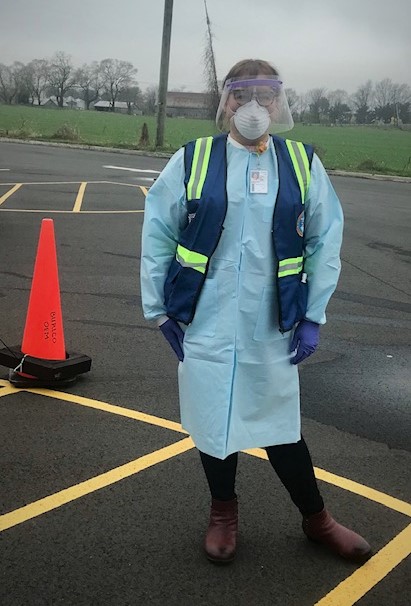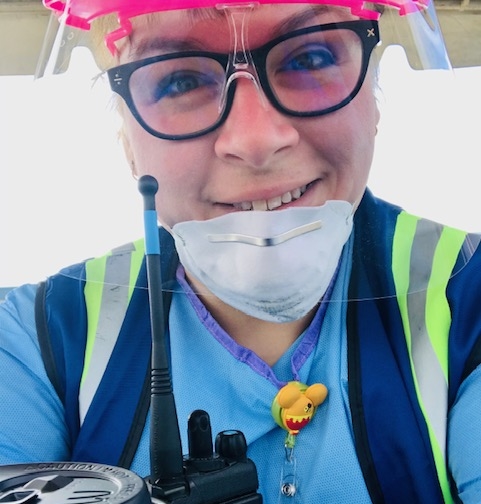Providing Disaster Response Counseling at a COVID-19 Testing Site
For 20 years, Dawn Reinhardt-Wood has served on her county’s disaster response crisis counseling team – during the Sept. 11 terrorist attacks, Hurricane Sandy, and episodes of school violence and suicide – but she never experienced anything like the COVID-19 pandemic.
“In this situation, everyone is affected. Everyone is at risk,” said Dawn.
A faculty member in the Rutgers School of Health Professions’ department of Psychiatric Rehabilitation and Counseling Professions, Dawn is serving as a volunteer team leader for the Burlington County Disaster Response Crisis Counselors, which was activated to assist with the COVID-19 response.
Stationed at a county-run testing center to meet the mental health needs of residents, the volunteers must first protect themselves before helping others.
In a gown, surgical gloves, an N-95 mask and face shield, Dawn works six-hour shifts at a drive-up center set up in a parking lot, where she puts her skills to work counseling and soothing those who are turned away, generally because they had no appointment.
She is on-site along with nursing students, civil air patrol and sheriff’s officers, all providing support to the center, which has been overwhelmed by people driving up in their cars, hoping to get a COVID-19 test.
On a recent day, 300 tests were scheduled.
Dawn gives guidance to people who are turned away, speaking to them through partially opened car windows, explaining how they can get tested, educating them on self-care, and telling them to reach out to a doctor if their fears are overtaking them.
“They are not permitted to get out of the vehicle. Some are frustrated, scared and upset, but most of the people I’ve talked to are very cooperative,” she said
If they aren’t, she has been directed to step back, a signal to the sheriff’s officers to come forward. That hasn’t happened so far, she said.
 The mental health disaster response team was established by the state’s Division of Mental Health and Addiction Services Disaster and Terrorism Branch to meet the psychological needs of residents during natural disasters, pandemic disease, terrorism, and other traumatic community events. Volunteers are trained in the provision of disaster mental health response, which not only includes counseling techniques specific to each type of disaster, but also logistical topics such as incident command and control.
The mental health disaster response team was established by the state’s Division of Mental Health and Addiction Services Disaster and Terrorism Branch to meet the psychological needs of residents during natural disasters, pandemic disease, terrorism, and other traumatic community events. Volunteers are trained in the provision of disaster mental health response, which not only includes counseling techniques specific to each type of disaster, but also logistical topics such as incident command and control.
“Of course we wish devastating events would never occur, but they do. Being able to offer one’s clinical skills and compassion during times when we are all suffering is extremely rewarding and a catalyst for recovery,” she said.
Currently, there is a need for more health professional volunteers, said Dawn. Anyone interested contact Dawn Reinhardt-Wood at or visit the DRCC certification website
